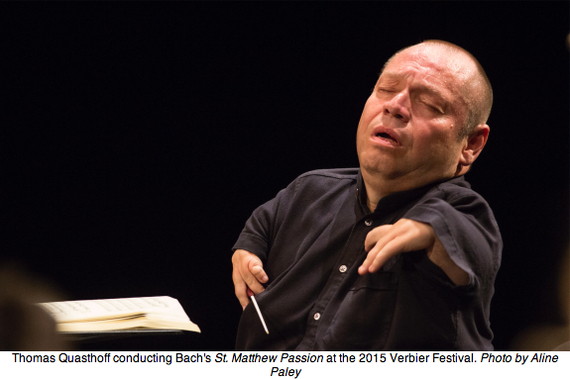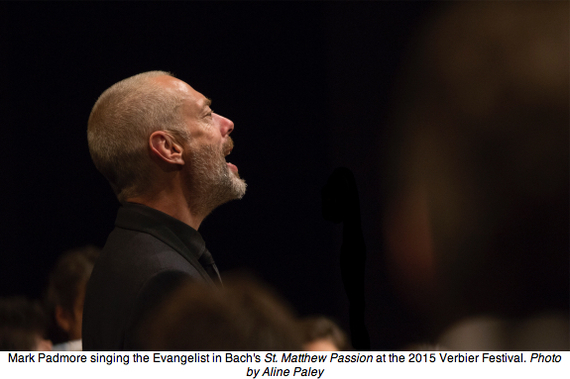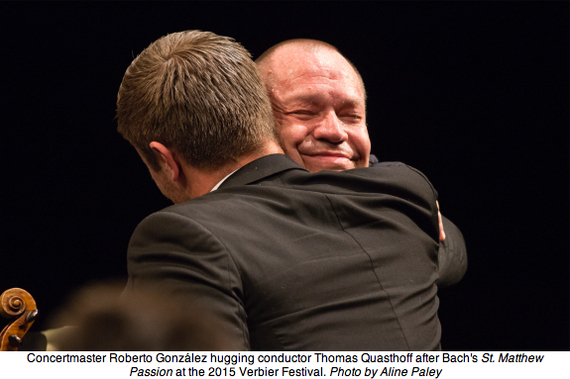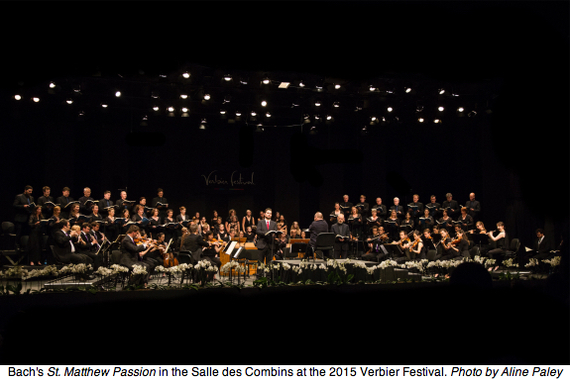Dateline: Verbier, Switzerland, Salle des Combins, 6 p.m., July 24, 2015
Just as Thomas Quasthoff began conducting the opening measures of the 21-year old Verbier Festival's first ever performance of Bach's St. Matthew Passion Friday night, an approaching thunderstorm arrived from over the surrounding high Alps, literally threatening everything in its path so that the terrible earthquake that follows Christ's death towards the end of Part 2 was reduced, for once, to mere mortal thunder. 
With the rain pounding down on the roof of the Salle des Combins, it was like hearing a recording of the music with pre-digital, analogue hiss; it was like a celestial critic's concern about playing such devotional music in a jet-set resort. Not to worry, the impact was devotional in its truest sense, and when the last chorus rolled to its close, the sold-out audience, young and old, rich and not so rich alike, roared their approval certain that they would never witness its like again.
Purely as a performance, Quasthoff, making a rare appearance as a conductor, asked for a relentless diet of passion, excellence and more passion-and got it. This was music making according to the latest musicological discoveries and corresponding illuminations, using the original 1727 version filled with insightful and compelling details lost in subsequent versions, with musicologist/performer par excellence Robert Levin at one of the two organs, its authenticity mitigated only by the large RIAS Chorus imported from Berlin, and the modern instruments played by the superb Verbier Festival Orchestra.
The performance was dominated by tenor Mark Padmore's Evangelist, at times tilting his head back as if speaking directly to the heavens, giving a demonstration of such exquisitely articulate, emotional, full-blooded, purely beautiful singing that it finally put to rest memories of the strangled but once standard issue tones of antediluvian tenors like Karl Erb who learned the Evangelist at the urging of Bruno Walter and recorded the role in early recordings under Willem Mengelberg with his Amsterdam Concertgebouw in 1939 and Günther Ramin with the Thomanerchor Leipzig and members of the Gewandhauschor and Gewandhausorchester in 1941. 
The rest of the singers were of similarly world-class standards and intensity, including Manuel Walser, Christopher Maltman, Christiane Karg, Bernarda Fink and Mauro Peter, but it was left to three key string players to provide a foundational core on a night only a film noir director could have imagined and only Verbier's founder and executive director Martin Engström could have assembled.
Primary among the three strings was the Spanish concertmaster Roberto González, taking a busman's holiday from being concertmaster of the Orchestra dell'Accademia Nazionale di Santa Cecilia in Rome, playing a smooth and creamy 1703 Giuseppe Guarnieri filius Andreae.
Counting among his key influences a wide assortment of stylists ranging from Ana Chumachenco and Reinhard Goebel to Charles Dutoit, González's large swooping gestures on the upbeats served as an extension of Quasthoff's unique combination of urgent facial entreaties and minimalist physical gestures, even raising up occasionally in his seat to make sure the assembled forces, particularly the second orchestra on the conductor's right, were getting the message; the result was a deeply personal musical vision that transcended mere criticism.
It therefore also came as no surprise that González played the solo violin part in the iconic alto aria, "Erbarme dich, mein Gott," with the kind of exquisite, profound tenderness that Quasthoff himself was famous for in his previous career as one of the world's leading bass-baritones.
Two other string players played similarly crucial if smaller roles, Nicolas Altstaedt playing continuo cello with stabilizing precision and an uncanny sense of timing, and Manfred Zeller, one of the Basel Chamber Orchestra's two solo cellists and counting Christophe Coin and Paolo Pandolfo as his original instrument teachers at the Schola Cantorum Basiliensis, playing the viola da gamba solo in "Komm, süsses Kreuz," with transcendent, eloquent ease.
For something in an actual original-instrument vein, a new recorded St. Matthew Passion from the Academy of Ancient Music conducted by Richard Egarr, also using the 1727 edition, is unusually dark, dusty, compelling and disturbing, flowing along as if a larger force were behind the message that the music was delivering in such an awesome, unforgettable way.
As it was Friday night in Verbier's vast 1700-seat Salle, which in different configurations can serve horse jumping shows and biker rallies, it's as if the musicians and the audience were joining together to console and inspire each other at a time of heightened strife among nations.
Bach, Thomas Quasthoff and the Verbier Festival Defy Mortal Storms: If Verbier itself is total Hollywood - the concert was even more so!
As it was Friday night in Verbier's vast 1700-seat Salle, which in different configurations can serve horse jumping shows and biker rallies, it's as if the musicians and the audience were joining together to console and inspire each other at a time of heightened strife among nations.
This post was published on the now-closed HuffPost Contributor platform. Contributors control their own work and posted freely to our site. If you need to flag this entry as abusive, send us an email.
